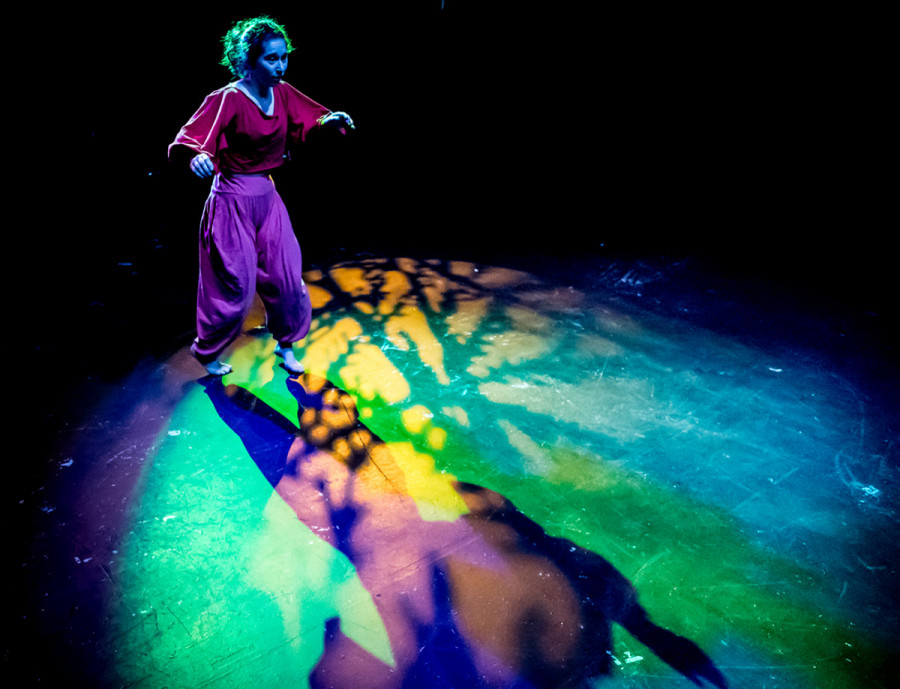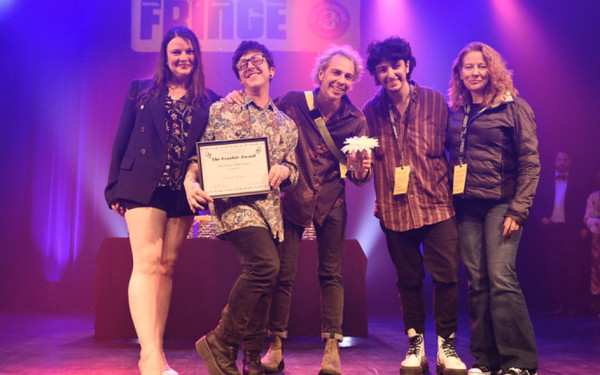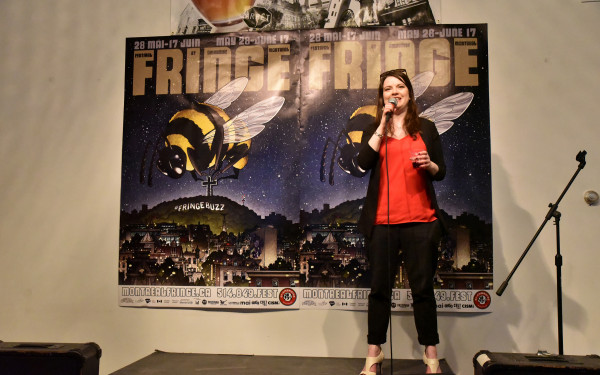‘The Moaning Yoni’: An Experience of Self-Discovery and Self-Acceptance
Fringe Play Addresses Taboos Through Comedy and Clowning
The show’s name, The Moaning Yoni, encapsulates the delicacy of the topic but also presents an interesting dichotomy.
Joylyn Secunda, performing for the first time at Montreal’s Fringe Festival, took the stage to present The Moaning Yoni. The comedy-infused one-woman show addressed taboos surrounding sexuality and insecurities most women have experienced at least once in their life.
“‘Yoni’ is used as a very sacred word for female sexual organs,” said Secunda. “And ‘moaning’ is such a blah word. So I thought it was funny to put ‘moaning,’ which is a grotesque word, next to ‘yoni,’ which is this really pure, spiritual thing.”
Secunda, who played all the characters herself, entered the stage as Crystal and immediately broke the fourth wall as she asked the audience to take deep, calming breaths with her.
The story all began when Zoë, the show’s main character, applied an elixir to her yoni following the instructions of Crystal, the guru leading a healing circle session.
Zoë entered the “inter-dimensional realms of consciousness,” a comic term poking fun at “new-age spirituality and some of the funny lingo,” according to Secunda. She personified the yoni as she stood with her feet spread apart, turned outwards, knees bent and fingertips uniting in a V-shape over her head.
Once the elixir kicked in, the yoni spoke so freely and unapologetically that it surprised Zoë—and the crowd too.
“I’m making eye contact, there is no fourth wall. I’m very much looking at the audience and engaging with them.” — Joylyn Secunda
It asked questions like ‘Why do you hurt me with a tampon?’ or ‘Why do you pluck my hair?’ leading to the realization that some habits are instituted through an unnoticed societal pressure.
The Moaning Yoni recounted Zoë’s experience of self-discovery as her yoni began to speak to her.
“It’s about her discovering her asexual identity or her feeling of not desiring sex in the same way that her friends might,” Secunda said.
Arms crossed and almost paralyzed with timidity, Zoë found herself sandwiched between her two friends chattering about their romances and personal experiences, who could not hold back their shocked expressions once they learned about Zoë’s inexistant love life.
The two later went on to do a one-on-one moaning face-off, drawing out amused reactions from the audience.
The show incorporated failed dating experiences some are all too familiar with. Secunda personified stereotypical guys on dating apps to demonstrate the types of kissers, from the waterfall to the woodpecker to the gropper—each one of them accompanied with music to fit the mood.
By the end of the play, Zoë accepted herself as she was and knew that she only had to live up to her own expectations. She didn’t have to feel ashamed of who she was.
Clown style brings unique performance
Playing more than a dozen roles within the 60 minute performance, Secunda split most of the time channeling discussions between Zoë and her yoni through clowning, a style of performance she took up during her studies in acting at the University of British Columbia.
Trained in the Pochinko technique—a style of clown performance created by Richard Pochinko—Secunda explained that this practice makes her aware that she is playing a role.
“Most of the time in the show, I’m aware of what the audience is doing. I’m making eye contact, there is no fourth wall. I’m very much looking at the audience and engaging with them,” she said.
Secunda noted that she personifies the characters in the show through clowning. “Clown is more like the mindset, not so much the aesthetic,” she said, which is how she finds herself in a “place of awareness and connection with the audience.”
Everyone can interpret it in their own way and adjust it to their own style. Clown has many variants and it is a technique in constant evolution.
“Clown is really hard to boil down into one thing, but for me, it’s like finding a place of playfulness and making a connection with the audience and living in that place,” she said.
The lively show incorporated a lot of movement to fully convey the characters’ feelings and emotions.
Secunda co-wrote and co-directed “The Moaning Yoni” with David Secunda, her father. The pair have been working together for 20 years as she was cast in a few of her father’s high school productions since the age of five.
“I like to express characters in heightened physicality,” Secunda explained. It allows her to showcase her background in contemporary dance and ballet. “It’s not the kind of thing that I can just sit down and write and imagine; I had to emboy in order to bring it in.”


_600_832_s.png)




